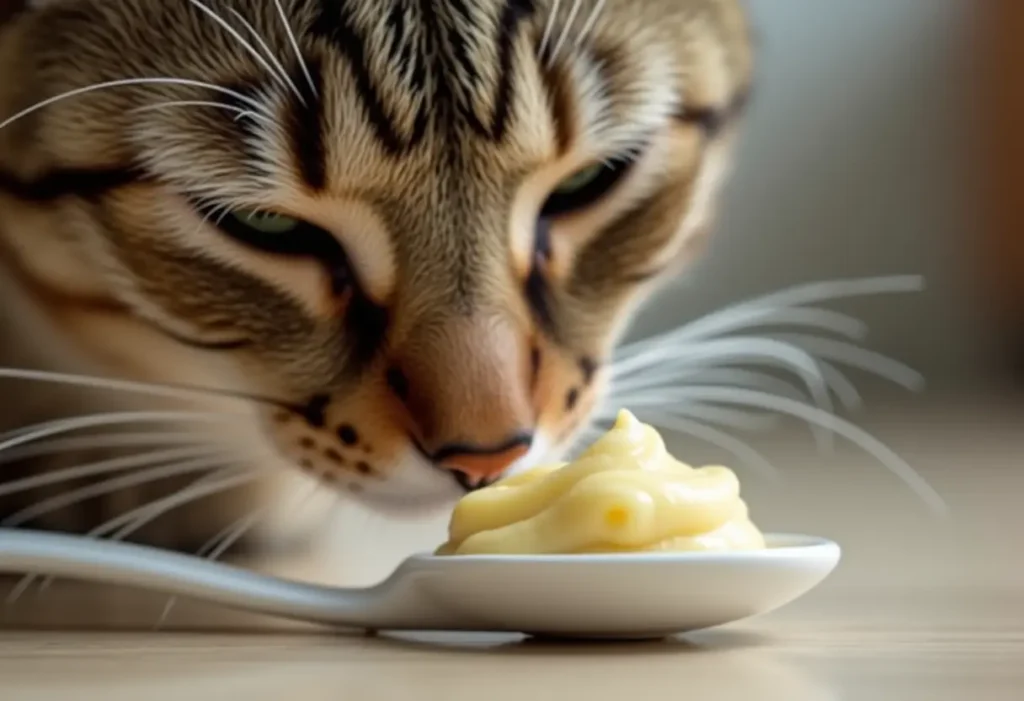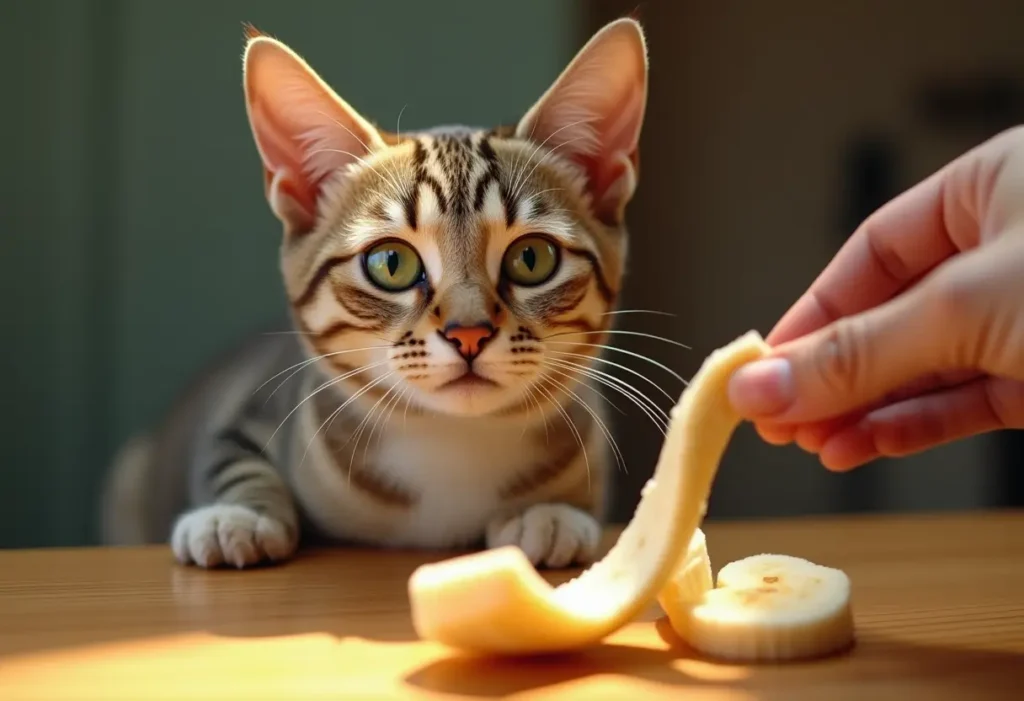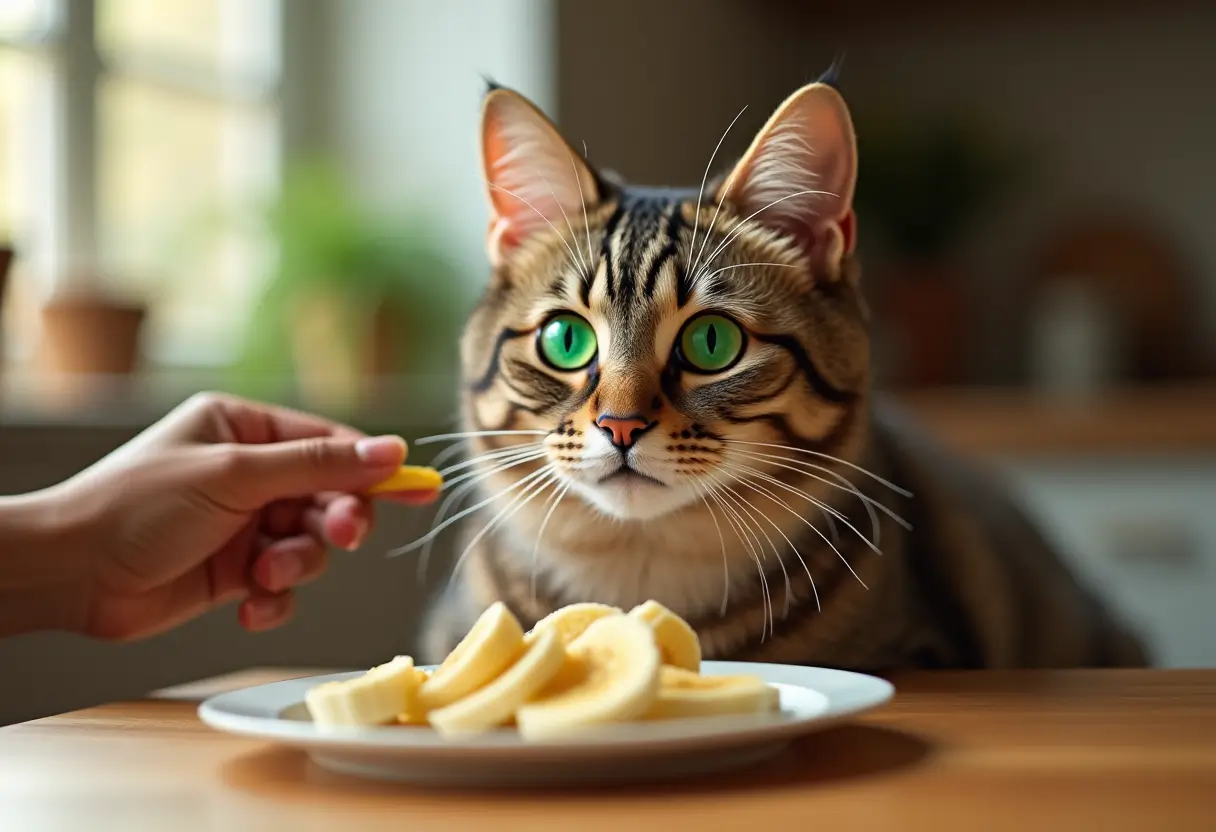Should You Try the Cat Banana Snack? Vet Answers!
Table of Contents
Should You Try the Cat Banana Snack?
Picture this: you’re enjoying your morning breakfast when your beloved feline companion sits beside you, emerald eyes fixed intently on the banana in your hand. Those adorable whiskers twitch with curiosity, and suddenly you’re wondering whether sharing this yellow fruit could be a delightful treat for your furry friend. If you’ve ever found yourself questioning can cats eat bananas, you’re certainly not alone in this common pet parent dilemma.
Your concern for your cat’s wellbeing demonstrates the deep bond you share, and seeking answers about proper feline nutrition shows responsible pet ownership. Understanding what foods are safe for your companion becomes crucial when those pleading eyes seem to beg for a taste of whatever you’re enjoying. This comprehensive exploration will provide you with veterinary-backed insights to help you make informed decisions about whether bananas belong in your cat’s dietary routine.
Can Cats Eat Bananas? The Scientific Truth Behind Feline Nutrition

When you consider whether your cat can safely consume bananas, understanding feline biology becomes essential. Your cat’s digestive system operates fundamentally differently from your own, designed specifically for processing animal proteins rather than plant-based foods.
Understanding Your Cat’s Unique Digestive Architecture
Your feline friend belongs to a category called obligate carnivores, meaning their bodies have evolved to derive essential nutrients exclusively from animal tissue. Unlike omnivores, your cat’s digestive tract lacks certain enzymes necessary for efficiently breaking down complex carbohydrates found in fruits like bananas.
Dr. Sarah Mitchell, a renowned feline nutrition specialist, explains that cats possess shorter intestinal tracts compared to omnivorous animals, designed for rapid protein digestion rather than prolonged plant matter processing. This biological reality significantly impacts how your cat’s system handles fruit consumption.
Your cat’s saliva doesn’t contain amylase, an enzyme crucial for initiating carbohydrate digestion that you naturally produce. Additionally, their pancreatic amylase production remains limited, creating challenges when processing the natural sugars abundant in bananas.
Banana Nutritional Profile Versus Feline Requirements
Bananas contain approximately 14 grams of sugar per medium fruit, primarily consisting of fructose, glucose, and sucrose. Your cat’s metabolism isn’t equipped to handle these sugar concentrations effectively, potentially leading to various health complications over time.
While bananas offer potassium, vitamin B6, and dietary fiber beneficial for humans, these nutrients don’t provide significant advantages for your feline companion. Your cat obtains necessary vitamins and minerals more efficiently from animal-based sources specifically formulated for their unique nutritional requirements.
What Leading Veterinarians Reveal About Cat Banana Consumption
Veterinary professionals consistently emphasize caution when considering whether your cat should consume bananas. Dr. James Rodriguez, a specialist in small animal internal medicine, notes that while bananas aren’t technically toxic to cats, they offer minimal nutritional value and potential risks that outweigh any perceived benefits.
Expert Consensus on Feline Fruit Consumption
Dr. Emily Chen, whose expertise encompasses feline behavior and nutrition, observes that many cat owners mistakenly assume human-healthy foods automatically benefit their pets. Your cat’s nutritional needs differ dramatically from yours, requiring careful consideration before introducing any non-feline-specific foods.
Recent clinical observations indicate that cats consuming regular fruit portions, including bananas, may experience digestive disturbances, weight gain, and blood sugar fluctuations. The American Veterinary Medical Association guidelines recommend limiting non-essential treats to less than 10% of your cat’s daily caloric intake, with emphasis on species-appropriate options.
Research Findings on Feline Digestive Responses
Studies examining cats and fruit consumption reveal that while immediate toxicity rarely occurs with small banana portions, long-term health implications deserve serious consideration. Your cat’s pancreas works harder to process excess sugars, potentially contributing to diabetes development in susceptible individuals.
Documented cases show that some cats experience gastrointestinal upset, including vomiting and diarrhea, following banana consumption. These reactions often correlate with portion size and individual sensitivity levels, making prediction difficult without careful monitoring.
Can Cat Eat Banana: Comprehensive Risk Assessment
Understanding both potential benefits and documented risks helps you make educated decisions about your cat’s dietary choices. While bananas aren’t immediately dangerous, several concerns warrant your attention.
Minimal Benefits for Feline Health
Bananas contain vitamin B6, which supports neural function, but your cat obtains adequate amounts from properly formulated commercial diets. The fiber content might seem beneficial for digestive health, but cats require minimal fiber compared to omnivorous animals, and excessive amounts can actually hinder nutrient absorption.
The antioxidant properties present in bananas don’t significantly impact feline health since cats possess different metabolic pathways for processing these compounds compared to humans.
Documented Health Concerns
Your primary concern should focus on the high sugar content, which can contribute to obesity and diabetes in cats. Even small portions add unnecessary calories to your cat’s diet, potentially disrupting their carefully balanced nutritional intake.
Some cats may develop allergic reactions to bananas, manifesting as skin irritation, digestive upset, or respiratory symptoms. The texture and size of banana pieces also present choking hazards, particularly for enthusiastic eaters who don’t chew thoroughly.
Do Cats Naturally Crave Bananas? Understanding Feline Behavior
Your cat’s interest in your banana likely stems from curiosity rather than genuine dietary desire. In natural settings, wild cats rarely encounter fruits, focusing their hunting efforts on small prey animals that provide complete nutrition.
Why Your Cat Shows Interest in Human Foods
Cats often exhibit interest in their owner’s food due to social bonding behaviors rather than hunger or nutritional need. Your cat may associate your eating activities with positive interactions, leading them to investigate whatever captures your attention.
The texture and temperature of room-temperature bananas might intrigue some cats, but this curiosity doesn’t indicate nutritional requirements or natural dietary preferences.
Safe Guidelines: Can Cat Have Banana Responsibly?

If you decide to offer your cat a tiny banana taste despite veterinary recommendations for species-appropriate treats, strict guidelines become essential for minimizing risks.
Portion Control and Frequency Recommendations
Limit any banana offering to an absolute maximum of 1/4 teaspoon for adult cats, and only as an extremely occasional treat. Kittens under six months should never receive banana due to their developing digestive systems. Senior cats require even smaller portions due to potentially compromised kidney function and reduced metabolic efficiency.
Preparation Safety Measures
Remove all peel material, which presents choking hazards and contains compounds difficult for cats to digest. Mash small portions to reduce choking risks, and always supervise your cat during consumption. Ensure the banana reaches room temperature, as cold foods can cause digestive shock in sensitive cats.
Never offer bananas to cats with existing health conditions, including diabetes, kidney disease, or digestive sensitivities, without explicit veterinary approval.
Superior Alternatives to Cat Banana Treats
Rather than risking potential complications with bananas, numerous cat-specific treat options provide genuine nutritional benefits while satisfying your desire to share special snacks with your companion.
Veterinarian-Approved Treat Options
Commercial treats formulated specifically for cats undergo rigorous testing to ensure safety and nutritional appropriateness. Look for single-ingredient protein treats, freeze-dried meat options, or treats certified by veterinary nutritionists.
Small portions of cooked chicken, fish, or other lean proteins offer much better alternatives that align with your cat’s carnivorous nature while providing genuine nutritional value.
Recognizing Warning Signs and Health Monitoring
Understanding potential adverse reactions helps you respond appropriately if your cat accidentally consumes banana or if you choose to offer a small taste.
Immediate Symptoms Requiring Attention
Watch for vomiting, diarrhea, lethargy, or changes in appetite following any banana consumption. These symptoms may indicate digestive distress or allergic reactions requiring veterinary consultation.
Long-term Health Considerations
Monitor your cat’s weight and energy levels if you regularly offer any non-essential treats. Gradual weight gain or changes in bathroom habits might indicate that treats are disrupting their nutritional balance.
Creating Optimal Nutrition Plans Beyond the Banana Question
Your cat’s health depends on consistent, species-appropriate nutrition rather than occasional human food treats. Focus on selecting high-quality commercial diets formulated by veterinary nutritionists to meet all your cat’s essential requirements.
Remember that treats should never exceed 10% of your cat’s daily caloric intake, and those calories are better invested in options specifically designed for feline health rather than human foods that provide minimal benefits.
Conclusion: Making Informed Decisions for Your Feline Friend
While the question can cats eat bananas generates curiosity among caring pet owners, veterinary science clearly indicates that bananas offer minimal benefits while presenting unnecessary risks for your beloved companion. Your cat’s health flourishes with species-appropriate nutrition, making commercial cat foods and cat-specific treats far superior choices.
The deep bond you share with your cat doesn’t require sharing human foods to demonstrate affection. Instead, focus on providing consistent, high-quality nutrition, regular veterinary care, and engaging playtime activities that truly enhance your cat’s wellbeing.
Ready to optimize your cat’s nutrition? Consult your veterinarian today about the best dietary choices for your specific feline friend, and discover cat-specific treats that will make both you and your companion happy while supporting their long-term health.

